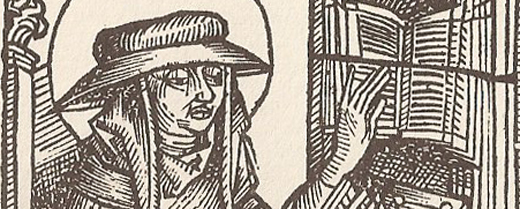Gotham Diary:
God and Self

A certain off-putting jokiness seems the only explanation for publishing “Silence,” Michael Symmons Roberts’s account of a retreat at Pluscarden, “the oldest working monastery in Britain,” in an issue of Granta devoted to Sex. Mr Roberts is not only a poet but a professor of poetry, and while his descriptive prose is lean and full of tact, and although he never encapsulates the object of his visit, there is nothing unconsidered in the thirteen short chapters. His tone of voice evokes monastic austerity as powerfully as any remark that he makes. But this is no sentimental journey. A Catholic married man with sons, he is honest enough to make the following confession:
I think about my own sons, and what I would do if one of them wanted to take up this life. I do believe that the constant prayer of these monastic communities is important, more vital than anything that goes on in the Pentagon or the UN. I like to think that I would support my sons in testing their vocation, and encouraging them to follow it through it is is real. But in reality, I would be heartbroken.
Once I’d read “Silence” all the way through, it persuaded me that curiosity about what Mr Roberts expected to find at Pluscarden could only be idle. What I backed up to was the relation between faith in God, which for Mr Roberts appears to be a completed gift, and the problematization of the self that has sent pious people into monastic seclusion since long before Benedict of Nursia regulated the practice with his famous Rule.
“Without a name or history I wake / Between my body and the day.” Auden was right. That is the chasm here, the tension. When everything that “self” means in the world is called into question, all that remains is the space, the tension between your body and the day. The monks have no career structure, no lovers and no children. I have all those things, but they mean nothing here. I think I’m losing myself. And of course, this is the point. You lose a sense of self in order to find God. “Always let go,” Father Benedict said to me, “never cling on. John of the Cross is fierce about this, and we strive for it, a constant letting go, to come closer to God.”
I heartily recommend Mr Roberts’s limpid and extremely sympathetic memoir. But nothing in the paragraph that I’ve excerpted makes sense to me, except the words. I come away from it, in fact, with a suspicion that the simplest way to build up an oppressive sense of self is to believe in God.
In my old age, I am coming to doubt the existence of the self, largely but not entirely for the reasons that cognitive scientists are advancing to discredit the concept. This isn’t to deny that I don’t come along bursting with needs and desires. But these seem to fall under two headings — wants of the body and demands for social status — that have little to do with some interior construction, known only to me, that we might call the self. My ideas about physical comfort are all too well known to everyone around me — and I am quite unashamed of them. When they become inconvenient, I blame the world, not my body. And nothing could be more public, or less interior, than my desire, such as it is, for respect and admiration. Or anybody else’s. The only thing that a putative self might do to affect my social standing is to interfere with my grasp of what it really is — to the extent that social standing can be grasped.
If I’m “conflicted” about anything in this life, it is not about how my self feels about my id. It’s rather about the difficulty of squaring the pursuit of social status with the gratification of material desire. Again: nothing about this could be less peculiar to me. Every healthy human being labors with the tension between various lacks and gaps that can’t be easily squared. And allow me to conclude with a short word about love: what’s “self” got to do with it? We’re too accustomed to talking “realistically” about the “failings” into which our longings lead us, and not nearly accustomed enough to remember our natural generosity — which may be considered, if reductively, as a desire, the desire to give. Just because evolutionary biology hasn’t so far explained altruism to anyone’s satisfaction doesn’t make it imaginary.
So: what’s left? The Benedictines of Pluscarden are obviously hostile to desire, but where is the self that they claim to be letting go of? What would it be doing if they gave it free rein? Why isn’t it enough to live the simple monastic round of hours and plainsong that they have chosen as a way of honoring their Creator? Why must there be a struggle — even in the most secluded cloister? And what is the struggle about, really?
